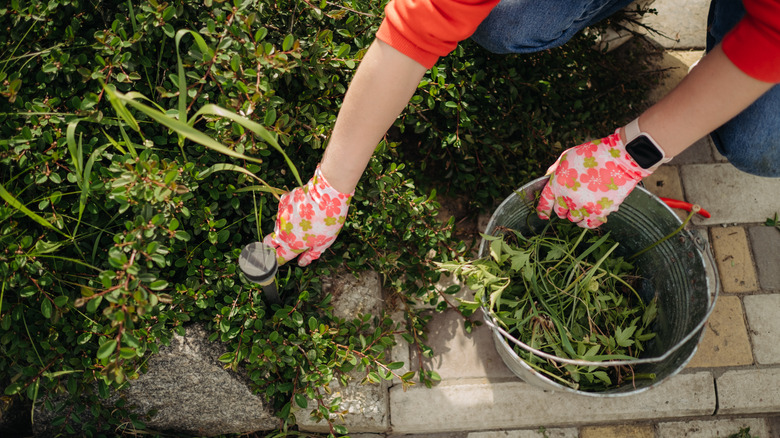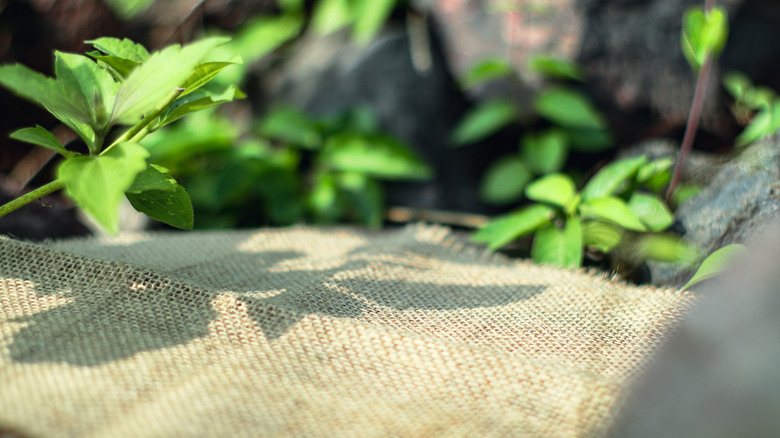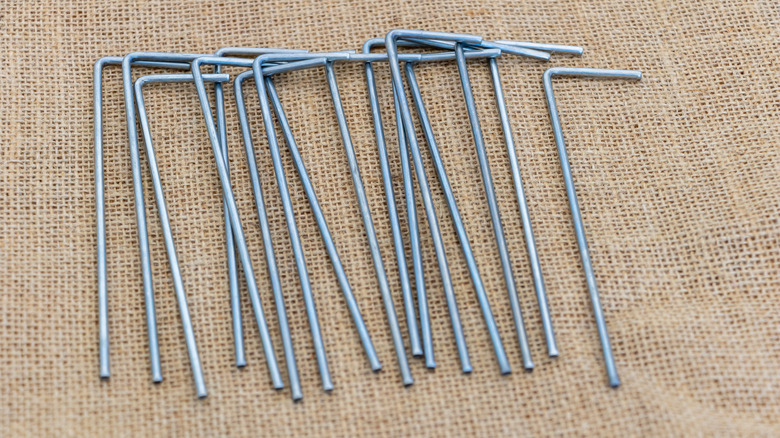The Natural Alternative To Landscaping Fabric For A Weed-Free Garden
We may receive a commission on purchases made from links.
If you find yourself pulling out your hair because you're beyond frustrated with pulling up all the weeds in your garden, you're not alone. In a recent survey, the Golf Course Lawn Store found 65% of homeowner respondents said fighting weeds was their top problem in the yard. Why not fight weeds with a natural weed barrier that's cheap and easy to come by: Burlap.
Burlap is a special kind of cloth made from the fibers of jute (Corchorus olitorius). The plant is native to India. And you might not know this, but jute is the second-most common cloth-producing plant in the world. Cotton, of course, is the first. The great thing about using burlap as a weed barrier is that it's all-natural and organic, unlike some weed barriers you find at hardware stores, which are often made of plastic. Eventually, when these plastic weed barriers begin to break down, microplastics might leech into the soil, which isn't good for the insects or birds who feed in the garden ... or for us, who might eat vegetables we plant there.
Burlap, however, is compostable. When used as a weed fabric, burlap prevents sunlight from getting to weed seeds. At the same time, it doesn't block either water and air, which the plants you want to grow will need. If you add in a layer of mulch on top of the burlap cover, you might even improve its weed-fighting capacity.
The benefits of burlap in the garden
Burlap doesn't just fight weeds. It can also keep your soil healthy. Plastic weed fabric might end up compacting the soil, which means water won't drain nearly as well. That could lead to some puny plants. Since burlap will break down and is organic, it adds in nutrients to the soil instead of compacting it. Also, burlap tends to be lighter than most stiff artificial weed fabrics, so it might be easier to install in your garden, too.
Of course, no weeding strategy will absolutely kill every weed, though gardeners do report some success with burlap. You can also use it in conjunction with other organic strategies, like the cardboard method of weed killing. Just know that since burlap is compostable, that means it'll eventually get absorbed by the soil. You might need to replace the weed cloth every year.
But you may not mind doing so if you spend less time pulling weeds in your garden or worrying about microplastics in the soil. If you want to try burlap as weed fabric, you can buy ready-made burlap weed barriers, like the Burloptuous gardening burlap roll, or grab burlap fabric from your local fabric store. The fabric comes in different weaves or weights. Usually, the heavier it is, the tighter the weave, and the less sunlight will get through. To fight weeds effectively, grab the burlap cloth, some mulch, and something to secure the fabric — like tent stakes.
Install burlap as a weed barrier in these easy steps
Before laying down your burlap, be sure to pull up any weeds or grass in your garden beds first. Then roll the burlap over the ground. Cut out holes for flowers that are already there or for the ones you plan to plant. Burlap is a fairly light fabric, so pinning it down with landscaping spikes is a good idea if you don't want it to blow away. Heavy rocks also work well here.
Remember, you can use several layers of burlap. Be generous with it, as any soil left uncovered could grow weeds. Add in mulch on top for an extra weed-killing measure. You can also use brown grocery bags for mulching weeds. Don't forget, if you're not using one continual piece of burlap, make sure the sheets meet — or even better — have edges laid on top of one another. Otherwise, weeds will find a way to poke up through any crevice.
Timing is so very important when it comes to installing burlap in your garden. You want to make sure your perennial plants are beginning to sprout before you lay it down. Otherwise, you could end up accidentally covering them up and blocking out the sunlight they'll need to grow. Also, if you want other organic, natural ways to fight weeds, try thinking about using other plants strategically, too. You can stop weeds from taking over the garden with the sweetest ground cover.


